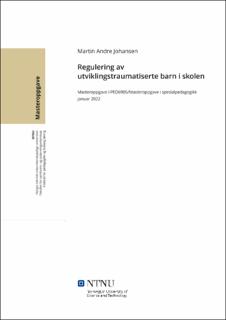| dc.contributor.advisor | Kvello, Øyvind | |
| dc.contributor.author | Johansen, Martin Andre | |
| dc.date.accessioned | 2022-07-13T17:19:39Z | |
| dc.date.available | 2022-07-13T17:19:39Z | |
| dc.date.issued | 2022 | |
| dc.identifier | no.ntnu:inspera:110011684:65004631 | |
| dc.identifier.uri | https://hdl.handle.net/11250/3005188 | |
| dc.description.abstract | Sammendrag
Skolen gjenspeiler samfunnet på godt og vondt. Konsekvenser av blant annet omsorgssvikt og belastede oppvekstsvilkår vil finne veien til skolegården. Barn og unge strever ofte med selvregulering som følge av manglende oppfølging. Det betyr at reguleringskompetanse på flere nivåer i organisasjonen har stor betydning for en rekke forhold. Det har blant annet stor betydning for elevenes trivsel og læring, og de ansattes arbeidsmiljø og mentale helse. For å undersøke regulering i skolen nærmere har studiet følgende problemstilling:
Hvilke kompetanser er hensiktsmessig for en pedagog å være i besittelse av for å kunne være en funksjonell reguleringsstøtte inn mot elever med utviklingstraumer, og hvordan kan pedagogen bli bevisst på og arbeide med egen aktivering og regulering i møte med denne elevgruppen?
På grunn av problemstillingens omfang avgrenses studiet ved å ta utgangspunkt i 3 overordnede kategorier, regulering i et forebyggende perspektiv, regulering i et akutt perspektiv og egenregulering fra et omsorgsperspektiv. Hovedkategoriene bygges opp av ulike underkategorier som baserer seg på informantenes opplevelser i møte med utviklingstraumatiserte barn og unge. Studiet tar for seg hvordan de ulike komponentene påvirker hverandre i reguleringsarbeidet der formålet er å ivareta elevgruppen, og opprettholde et hensiktsmessig aktiveringsnivå blant pedagogene (omsorgsgivere). Det empiriske grunnlaget for studiet er utført etter en kvalitativ metode, der generering av data er hentet ved 4 semistrukturerte dybdeintervjuer ved ulike skoler innenfor Bergen kommune.
Resultatene fra studiet viser at reguleringskompetansen innad på skolene virker å være noe tilfeldig. Det er mye som tyder på at det mangler en felles forståelse rundt tematikken, og det er lite systemisk arbeid rundt barn som lider av utviklingstraumer. Studiet viser at reguleringsferdigheter som baseres på forskning, og en mer effektiv distribusjon av kunnskap innad i organisasjonen vil være nyttige grep for å ivareta barn og voksne. Det vil bidra med en bedre praksis inn mot elevene, og hjelpe pedagogen med å opprettholde et aktiveringsnivå innenfor aksepterte rammer. | |
| dc.description.abstract | Abstract
The school reflects society for better or for worse. Consequences of neglect and poor upbringing conditions will find their way to the schoolyard. Children often struggle with self-regulation because of lack of support from primary caregivers. This means that the school must develop its competence to be able to meet the challenges that lies ahead. Regulatory competence at several levels in the organization is of great importance for several reasons. It is important for the students 'well-being and learning, and the employees' work environment and mental health. To explore regulation in the school in more detail, the study is based on the following research question:
What competencies are appropriate for an educator to possess to be a functional regulatory support towards students with developmental trauma disorder, and how can the educator work with their own activation and regulation in meeting with this group of students?
Due to the scope of the problem, the study is delimited by taking as a starting point 3 main categories, regulation in a preventive perspective, regulation in an acute perspective and self-regulation from a caregiver perspective. The main categories are made up of various subcategories that are based on the informants' experiences in encounters with developmentally traumatized children and young people. The study addresses how the various components affect each other where the purpose is to take care of the student group and maintain an appropriate level of activation among the educators (caregivers). The empirical basis for the study is performed according to a qualitative method, where data generation is obtained from 4 semi-structured in-depth interviews with educators from different schools.
The results from the study show that the regulatory competence within the schools seems somewhat random. There are many indications that there is a lack of a common understanding of the topic, and there is limited systemic work around children who suffer from developmental trauma disorder. The study shows that regulatory skills based on research, and a more efficient distribution of knowledge within the organization will be useful measures. It will contribute to a better practice towards the students and help the educator to maintain an activation level within accepted limits. | |
| dc.language | nob | |
| dc.publisher | NTNU | |
| dc.title | Regulering av utviklingstraumatiserte barn i skolen | |
| dc.type | Master thesis | |
